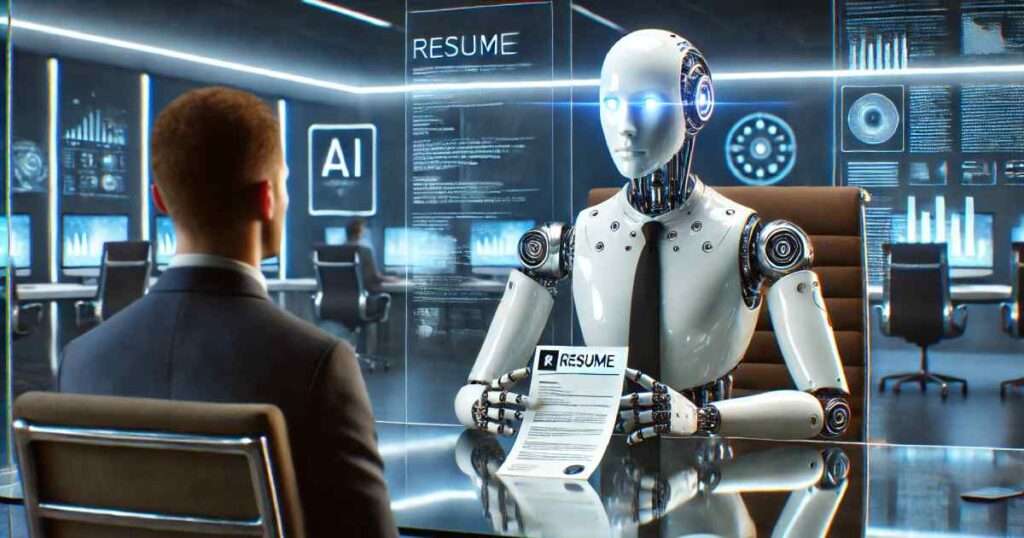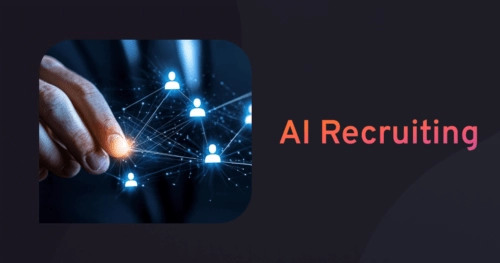What is AI Recruitment?
AI recruitment (also known as AI recruiting or automated hiring) is the application of artificial intelligence specifically Generative AI (GenAI) and Machine Learning (ML) to give the hiring process a serious upgrade. As a critical component of modern AI for HR solutions, it goes way beyond just automating the basics.
We’re talking about technology that leverages Agentic AI in HR to identify top-tier talent, autonomously schedule those critical face-to-face interviews, and significantly reduce bias. This technology handles the heavy lifting of logistics and screening, ensuring your team can focus on what actually matters: building human connections.
The State of AI in Recruitment (2025 Data) HR teams have moved past the “exploration” phase; we are now in the era of “dependency.” As we navigate through 2025, the data makes one thing clear: integrating AI for HR solutions is a non-negotiable for teams that want to stay competitive.
- Adoption is Serious: The numbers back this up 70% of companies piloting GenAI are doing so specifically within HR, with talent acquisition topping the list of use cases.
- Market Growth: The sector is thriving. The global AI recruitment market is projected to hit $1.35 billion by 2025, growing at nearly 19% year-over-year.
- Efficiency Gains: Companies leveraging Agentic AI workflows are seeing massive productivity spikes. High-volume hiring teams report reducing their time-to-hire by days, and in some cases, weeks.
- Candidate Expectations: Let’s face it: speed matters. 52% of candidates say they will walk away from a job offer if the recruitment process is slow, disjointed, or poor.
The Importance of AI in Modern Talent Acquisition
In 2025, recruitment teams are staring down a perfect storm of challenges: the relentless war for skilled talent, pressure to reduce time-to-hire, shrinking budgets, and the complexity of managing a hybrid workforce.
Generic “digital transformation” is no longer enough. To navigate this landscape, forward-thinking organizations are deploying AI Copilots for HR. By integrating these advanced AI for HR, organizations can automate administrative friction and empower recruiters to return to their core purpose: finding and nurturing the right people.
1. Simplifying Recruitment via Automation
Recruiters often spend up to 60% of their week on low-value logistics. AI reverses this by automating tedious tasks such as generating job descriptions, screening high-volume applications, and managing interview logistics.
- The Impact: By offloading these administrative burdens to GenAI tools (like ChatGPT for HR or purpose-built enterprise models), hiring managers gain consistency and speed. This ensures a smoother candidate experience, as applicants are no longer left in the dark due to manual bottlenecks.
2. Boosting Team Collaboration and Alignment
One of the hidden ROI factors of AI in recruitment is how it breaks down silos. Often, the recruiter, hiring manager, and interview panel are out of sync.
- The Solution: Platforms like Aisera act as a central nervous system for the hiring team. By providing real-time updates and a unified view of the hiring pipeline, the AI ensures transparency. When Agentic AI handles the coordination sending nudges, summarizing feedback, and scheduling debriefs collaboration becomes seamless, leading to faster consensus and fewer missed opportunities.
3. Driving Smarter, Data-Backed Decisions
Gut feeling is no longer a scalable strategy. With AI at its core, the recruitment process shifts from subjective to objective.
- Predictive Intelligence: By leveraging advanced analytics, AI tools review historical hiring patterns and market trends to predict candidate success with high accuracy. This data-driven approach reduces guesswork, minimizes bias, and helps organizations identify not just who is available, but who will thrive in the role long-term.
How AI Recruiting Tools Transform the Hiring Lifecycle
AI is more than just reading a resume. It’s about building a comprehensive ecosystem where technology plays a key supporting role in your broader AI for HR solutions. It shifts the recruiter’s job from “data entry” to “strategy.”
1. Sourcing and Screening, The High-Volume Triage:
The first place you notice the impact of AI is managing the sheer volume of applications. Traditional ATS (Applicant Tracking Systems) filter out candidates just by matching exact keywords meaning, they often miss out on top talent who simply used the “wrong” word.
- Matching the Whole Story (Semantic Search): AI uses Natural Language Processing (NLP) to look at the actual context of a resume, not just keywords. It understands that a “Client Success Manager” likely possesses the same transferable skills as an “Account Manager,” ensuring no good candidate slips through the cracks.
- Truly Fair Screening: By stripping away identifying info (names, schools, ages), AI tools focus on what really matters: skills and experience. This is essential for companies looking to operationalize their diversity, equity, and inclusion (DEI) goals.
2. Automated Candidate Engagement: Because Candidates Expect Action
In today’s world, people expect instant gratification. If you make them wait weeks for a reply, they’ve already moved on.
- Having a Real Conversation: Unlike those clunky old chatbots that spouted rigid scripts, modern GenAI assistants can answer actual questions about company culture, benefits, and role expectations—and do it in real-time, 24/7.
- Agentic Scheduling: This is where Agentic AI in HR truly shines. Instead of just sending a link, the AI agent actively coordinates between the hiring manager’s Outlook/Google calendar and the candidate’s availability to book the meeting. No more email “ping-pong.”
3. Predictive Analytics: Predicting Whether a Hire Will Pay Off
Machine learning algorithms for HR don’t just look at who is applying; they look back at who has turned out to be a great hire historically to figure out what made them tick.
- Finding the Right Fit (Success Profiling): AI analyzes your current top performers, identifies the DNA of their success (soft skills, background patterns), and flags applicants with similar traits as high-potential winners.
- Who’s Going to Stick Around: Even better, some advanced systems can predict attrition risks, estimating whether a candidate is likely to stay long-term. This insight is critical for keeping turnover costs down and improving employee retention.

Challenges in AI Recruitment (and How to Solve Them)
1. Data Bias and “The Black Box” Problem
If an AI is trained on historical data where men were predominantly hired for leadership roles, the AI may learn to penalize female candidates.
- The Solution: Use Explainable AI (XAI). You must know why a candidate was ranked #1.
- Aisera’s Approach: We utilize the TRAPS Framework (Trusted, Responsible, Auditable, Private, and Secure) to ensure our Enterprise LLM is grounded in ethical guidelines, mitigating bias before it impacts decisions.
2. Data Privacy and Compliance (GDPR/CCPA)
HR deals with sensitive personal identifiable information (PII). Using open-source models for candidate data is a security risk.
- The Solution: Domain-specific LLMs, unlike public tools, enterprise-grade AI ensures that candidate data remains within a private, secure perimeter, fully compliant with GDPR and CCPA.
3. The “De-Humanization” Fear
There is a valid concern that AI will make recruiting cold and impersonal.
- The Reality: By automating the administrative 40-60% of a recruiter’s workload, AI actually increases the time humans can spend building relationships. AI handles the scheduling; the recruiter handles the connection.
The Rise of Agentic AI in HR
While Generative AI creates content (like job descriptions), Agentic AI takes action. This is the frontier for 2025 and a key focus for our HR solutions. Agentic AI systems can autonomously perform multi-step workflows with minimal human oversight.
- Example: An AI agent spots a candidate on LinkedIn, analyzes their profile against the job description, drafts a personalized outreach email, sends it, and if the candidate replies, auto-schedules the screening call.
- Collaboration: These agents act as a “digital workforce,” integrating seamlessly with systems like Workday, ADP, and Salesforce to keep data synchronized.
- Note: This shifts the recruiter’s role from “Administrator” to “Strategic Talent Advisor.”
Best Practices for Implementing AI in 2025
To successfully deploy AI for HR Solutions, follow this checklist:
- Audit Your Data: AI is only as good as the data it is fed. Clean up your ATS data before integration.
- Define the “Human in the Loop”: Decide which decisions (e.g., final offer) require human sign-off and which can be automated (e.g., initial screening).
- Prioritize Candidate Experience: Test your AI chatbot. Is it helpful? Does it sound robotic? Use GenAI to give it a brand-aligned personality.
- Select the Right Partner: Look for tools that offer Agentic capabilities, not just simple automation.
Conclusion: The Future is Human-Centric, AI Recruiting
The question is no longer if you should use AI in recruitment, but how fast you can integrate it. The future belongs to organizations that combine the efficiency of Agentic AI with the empathy of human recruiters. By leveraging tools like Aisera’s HR Copilot, companies can turn talent acquisition into a strategic advantage for hiring faster, fairer, and smarter.
Book a custom AI demo for your enterprise to experience the power of Aisera’s agentic AI for HR today!

